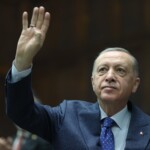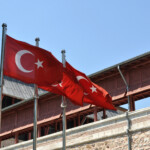Turkey and Central Asia have found their groove recently. Growing trade, emerging military cooperation, new transport routes, and strengthening political engagement are its hallmarks.
Recep Tayip Erdoğan’s victory in Turkey’s presidential elections in May 2023 was welcomed by presidents of Central Asian countries. All five regional leaders congratulated Erdoğan on his victory, with Uzbekistan’s president Shavkat Mirziyoyev calling to congratulate even before the announcement of the official results. Kyrgyzstan’s Sadyr Japarov and Turkmenistan’s Serdar Berdymukhamedov did not hide their sympathy for Erdoğan as they called him “dear brother” in their congratulatory letters.
All presidents except Tajikistan’s Emomali Rahmon attended the inauguration ceremony, during which Erdoğan cordially greeted them on his way to the podium.
Central Asia and Turkey share history and culture, which is now being complemented with growing trade, political, and security cooperation. Inhabitants of the four Central Asian countries and Turkey are representatives of Turkic people with common ancestors and similar languages. Turks that now populate Turkey moved there from Central Asia in the 11th century.
The two sides have used the theme of Turkic brotherhood to build multifaceted cooperation, which has expanded significantly in the last several years. After the cooling off in the relations in the 1990s and early 2000s, the blossoming of cooperation between Turkey and Central Asia has come to pass under Erdoğan’s rule. Central Asian leaders and Erdoğan are similar in their authoritarian political practices. Erdoğan’s victory allows Central Asian presidents to continue working with the kindred political character without spending time on building new relationships.
Turkey was the first country to recognize the independence Central Asian states and establish diplomatic ties following the collapse of the Soviet Union in 1991. Over 140 agreements on political, cultural, economic, and military affairs were signed between Turkey and Central Asian countries between 1991 and 1993, signaling ambitious plans for cooperation. However, Turkey’s lack of robust financial and military institutions, and its inability to offer large-scale support turned the region towards other regional and global players, such as Russia, China, and the US.
Until 2009, cooperation between Central Asia and Turkey was modest and existed mostly in the economic, cultural, and educational spheres. It gained institutional form in 2009, when the heads of states of Azerbaijan, Kazakhstan, Kyrgyzstan, and Turkey established the Cooperation Council of Turkic-Speaking States (CCTS). The organization’s goal was deepening cooperation between Turkic-speaking countries and contribution to regional peace and stability.
In practice, Turkey gained a platform for exerting its influence and expanding its footprint in Central Asia and beyond, whereas the regional states added another actor to balance out Russian and Chinese influence in the region. The establishment of the CCTS also kickstarted Turkey’s increased economic engagement with the region in the form of investments and trade. The trade turnover between Turkey and Central Asia grew from USD 6.5 billion in 2010 to USD 8.6 billion in 2014.
The CCTS has grown to include Uzbekistan as a member and Turkmenistan and Hungary as observer parties to the organization. In 2021, it was renamed the Organization of Turkic States (OTS). The renaming was a further sign of Turkey and Central Asia’s commitment to deepen cooperation. At the first OTS summit in Samarkand, Uzbekistan, in 2022, its member states laid out plans to coordinate foreign policies and enhance cooperation in the academic, transport, trade, customs, and digitalization spheres.
Trade between Turkey and Central Asia has been steadily growing, allowing both sides to pursue their foreign policy agendas. Almost 4,000 Turkish companies operate in the region, with Turkey having invested over USD 85 billion into the Central Asian economy. In 2022, the total trade turnover reached a historic high of USD 12.33 billion. In doing so, between 2021 and 2022, Turkey’s trade turnover increased significantly with all Central Asian states except Uzbekistan. What lies at the core of this growing partnership are Turkey’s need for energy resources and new markets and Central Asian states’ quest for investment and diversification of export routes.
Turkey almost exclusively relies on energy imports as its domestic output covers only three percent of its energy needs. In this regard, economic and transport cooperation with oil and gas rich Turkmenistan and Kazakhstan is of strategic importance for Turkey. For Central Asia, Turkey presents itself as a major market and transit hub for exporting oil and gas to European countries. For Turkmenistan, it means selling its gas at much higher prices in new markets, and for Kazakhstan, it means reducing its reliance on Russia for exporting its oil and gas to global markets.
In this regard, both sides see each other as important geographical connecting actors. The OTS member states have a common interest in transport cooperation to turn the so-called Middle Corridor, a route connecting Asia with Europe and running through the territories of the OTS member states and Georgia, into a viable transport corridor for the flow of goods. Russia’s invasion of Ukraine and its fall under unprecedented sanctions has made transporting goods from China to Europe via the Eurasian Northern Corridor difficult and provided an impetus for developing the Middle Corridor. The success of this new transport route will provide landlocked Central Asia with access to the sea and global markets and help turn Turkey into a major energy transit hub.
Finally, in recent years, Central Asia and Turkey have seen an emergence of military cooperation. The turning point was Turkey’s support of Azerbaijan in the Second Nagorno-Karabakh War against Armenia in the fall of 2020, when Turkish military drones gave Azeri forces the decisive technological advantage. Turkmenistan was the first to purchase Turkey’s Bayraktar TB2 drones in 2020. Kyrgyzstan followed and purchased similar drones in 2021 and has since added the Akinci and Aksungur models to its arsenal. Kyrgyzstan is reported to have used its TB2 drones during the military border conflict with Tajikistan in September 2022. In May 2022, Turkey and Kazakhstan sealed a deal to start producing Anka attack drones in Kazakhstan.
Turkey and Central Asia have found their groove recently. Growing trade, emerging military cooperation, new transport routes, and strengthening political engagement are its hallmarks. Erdoğan is one of the main actors spearheading this renaissance in relations. The most active and productive phase of cooperation has come under his rule. Central Asian presidents celebrated Erdoğan’s victory in the presidential elections understanding they will continue having a familiar, reliable, and eager partner in Turkey under his rule.
This article was originally published by Global Voices.
The views and opinions expressed above are the author’s and do not reflect those of the Free Turkish Press.


